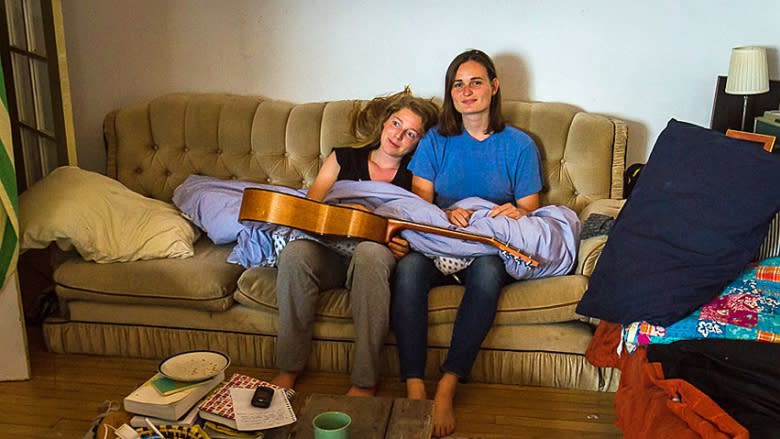The delicate balancing act of 21st-century couch living
We can thank Lord Philip Stanhope, the 4th Earl of Chesterfield for commissioning the first finely crafted settee of its type in the early 1700s. The purpose was to allow gentlemen to sit in comfort without wrinkling their clothes.
But ever since there have been chesterfields — or sofas or couches — they have been used for other purposes.
Like sleeping. Which is now being done in a most 21st-century way.
For some years, there has been a website where, with a couple of clicks, you can find a couch anywhere in the world where you can sleep for a night or two. For free.
But couch surfing is being pushed to new heights, or horizontals, with practitioners — couch livers — sometimes camping on other people's chesterfields for weeks and weeks and weeks on end.
These new urban nomads keep their laptops, cellphone chargers, clothes and toothbrushes in backpacks and plastic bags, ever thankful not to pay rent, ever-ready to move on when the time comes
'Didn't necessarily want her to leave'
Sophie Blais's pot of espresso coffee whistles away on the stove.
A recent McGill graduate Sophie is spending the year just getting to know Montreal, happily taking time to hang out before she decides on what she is going to do next. She tiptoes over and pulls the pot off. It's 8:30 in the morning but she doesn't want to wake Claris who is sound asleep on the well-worn living room couch just a few metres away.
"So I told Claris she could stay for a few weeks," Sophie says, "because I knew she wanted to come to live in Montreal.
She just stayed and we sorta talked about finding her a new place, but we just all got attached to her and didn't necessarily want her to leave."
Sophie and her three other roommates each have a bedroom in this third floor downtown walk-up. There are beer bottles lined up against a wall, tofu in the fridge and a tangle of laptop chargers and textbooks sitting on the counter.
As Blais sees it, there is a big difference between "couch surfing" and "couch living."
"A couch surfer would come for two or three days," she says, "you find them online, it's a great community.
"The first few times I was a little wary of who was coming into my house, but after a while you get to trust and you get to talk to people. They stay a week at the longest."
Claris opens her eyes. She smiles. She’s from British Columbia and with her back pack and guitar has travelled from one end of Canada to the other.
She knew somebody who knew somebody and that is one evening she ended up knocking on the apartment door. That was over a month ago.
The smell of fresh espresso filling the apartment is just too tempting. Sophie hands Claris a mug.
Over the weeks they have tiptoed around talking about rent, grocery shopping and dishwashing.
"I remember reading [the French sociologist] Michel Foucault," says Claris, "and he talks about certain architectural structures that coerce you to live in a certain way.
"But if you change the structure of a house it changes even the way you think about the world. And this couch is the perfect size for me."
This month Claris promised to pay the internet. And maybe find a job.
Some inconveniences
Dan and Eli are best friends. Just like Claris they have been living on friends' couches for months.
Dan a student in his early twenties has not told his parents who live south of the border.
"I would want them to have a peace of mind," he says. "I am not sleeping on park benches; it is inside places with oscillating fans and running water."
"Right now I have three different places that I have my stuff at," says Eli, who plays in a local rock band. "I have my records at one place; I have a few toothbrushes around town."
Dan keeps deodorant, a toothbrush and socks in his nylon backpack — along with a roll of toilet paper. "I am between three different apartments," he says.
Eli remembers the "place where the owner’s cat pooped on my bed."
"I just wanted to stay out of their hair, stay out late at night," so he would still be welcome. "You want to do the dishes for sure, just be a lot more conscious of how you take up space."
He has a theory on why his friends don't mind him staying on, and on, and on.
We are "living in an age when people share more, it is a sharing economy," he says.
As he sees it, he is simply "employing social networks that are becoming culturally more acceptable," as a generation of 20 year olds tries to get by.
It's a great way to save money, he says. But it does have its inconveniences.
A couple of nights a week Dan sleeps on a couch in a musician's apartment. She likes to practice violin at 3a.m.
"I miss privacy," he says.
He also recalls the day he was at work "and I unzipped my backpack and there was a roll of toilet paper and the boxers I was planning to wear the next day.
"And I was like 'oh, crap' because there is still a stigma associated with it. I don't necessarily want to advertise to the people at the office where I work that I am oscillating between three different dwellings.
Couch living "isn't necessarily a mark of stability, which is valued in the workplace," he says. "But I have never felt unsafe. And that is a privilege."



